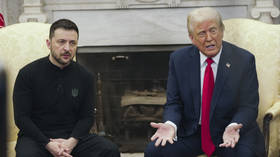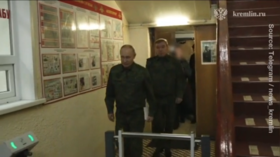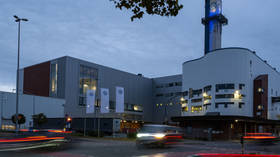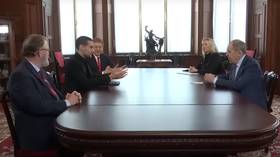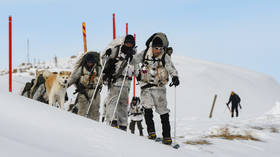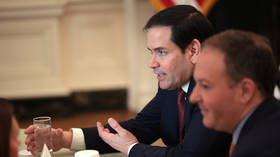Right makes might, not other way around: Obama sums up war on terror legacy
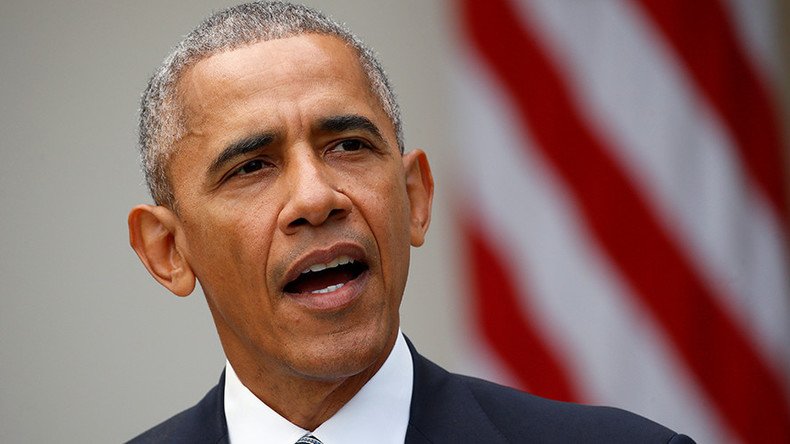
In his final national security speech, outgoing US President Barack Obama addressed drone warfare, the rise of the Islamic State under his watch, as well as the future of counterterrorism and other foreign policy issues to a military audience at the MacDill Air Force Base near Tampa, Florida, headquarters of the US Central Command.
On Tuesday, Obama defended his legacy of fighting Al-Qaeda and the Islamic State, recounting history as far back as the 2003 invasion of Iraq under President George W. Bush to his own administration's operations.
Claiming credit for the US withdrawal from Iraq and Afghanistan while acknowledging the challenges of fighting Islamic State (IS, formerly ISIS/ISIL), he aruged that things are better off today than eight years ago, he said President-elect Donald Trump will inherit a “sustainable” counterterrorism strategy.
On Monday, the White House released a 61-page report describing the extent of counterterrorism operations around the world, based on the October 2001 Authorization for the Use of Military Force (AUMF) congressional resolution.
“We are and must remain the strongest fighting force the world has ever known,” Obama said Tuesday in a speech that thanked the US military as well as intelligence, homeland security and diplomatic officers for keeping the US safe.
Drones better option than airstrikes & invasions in terms of casualties - Obama https://t.co/MHTlGVmyLbpic.twitter.com/6AsVo0yfPu
— RT America (@RT_America) December 6, 2016
The 44th US president outlined his own foreign policy before the rise of IS, saying the “focus on Al-Qaeda, the most dangerous threat to the us at the time, paid dividends,” calling the terrorist group “a shadow of its former self.”
“I don’t want to paint too rosy a picture,” Obama clarified. “The situation in Afghanistan is still tough.”
“War has been a part of life in Afghanistan for over 30 years,” the president added.
Obama dismissed critics who believe the US troop pullout from Iraq in 2011 led directly to the rise of IS. He said keeping US troops there, under a weakened status of forces agreement with the Iraqi government, “could not have reversed the forces” that led to the rise of IS.
Torture, including waterboarding, unacceptable & unnecessary, doesn't help with intel - Obama https://t.co/MHTlGVmyLbpic.twitter.com/iqkjsJefQO
— RT America (@RT_America) December 6, 2016
Crediting the US-led coalition of 70 countries battling IS, Obama said, "today, the results are clear," claiming that IS has lost more than half its territory and faces a dwindling recruitment effort as local populations turn against the terrorist network and insurgency.
Obama cited military and coalition operations in Libya, Mali, Somalia and Yemen as successes.
"To say that we've made progress is not to say the job is done," Obama said. "In some form, this violent extremism will be with us for years to come."
Challenges noted by Obama included corruption in foreign governments and "a changing climate [which] is increasing competition for food and water," which drew applause.
No terrorist organization has successfully orchestrated attack on our homeland - #Obama in his last security speech https://t.co/MHTlGVmyLbpic.twitter.com/cR8Rfiwd6S
— RT America (@RT_America) December 6, 2016
Another hot button political issue Obama mentioned was gun control, as he explained that the primary threat faced inside the US is now lone-wolf "deranged killers" who self-radicalize under the radar of counter-terrorism programs and have easy access "to buy a very powerful weapon."
If we stigmatize "good, patriotic Muslims" we encourage terrorism and betray our principles - Obama https://t.co/MHTlGVmyLbpic.twitter.com/o92tbbvHIK
— RT America (@RT_America) December 6, 2016
Obama stressed the importance of "the confidence that right makes might, not the other way around" as an American value that will serve the country's security goals.
“The fact is people in nations do not make good decisions when they are driven by fear,” Obama said before segueing to the matter of the Guantanamo Bay detention camp, saying it was “time to shut down” the controversial military prison in Cuba.
Obama claimed military leaders’ support for his view that Gitmo be closed, which he promised to do when first campaigning for the presidency in 2008. He blamed “the politics of fear” in Congress for the failure to do so during his two terms.
“We're wasting hundreds of millions of dollars,” Obama said of the facility that now detains 59 prisoners, down from over 250 when Obama entered the White House.
“That's not strength,” he said, adding, “I will do all I can to remove this blot on our national honor.”
Responding to Iraq plea to help against ISIL we avoided mistakes of 2003 that led to ISIL creation - Obama https://t.co/MHTlGVmyLbpic.twitter.com/8I1THvq7Pv
— RT America (@RT_America) December 6, 2016



